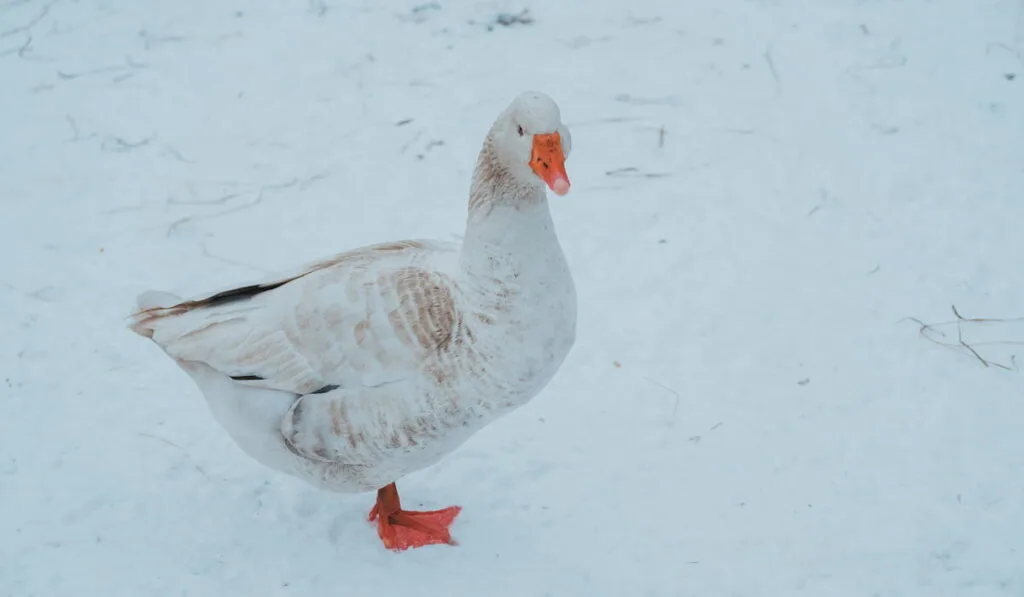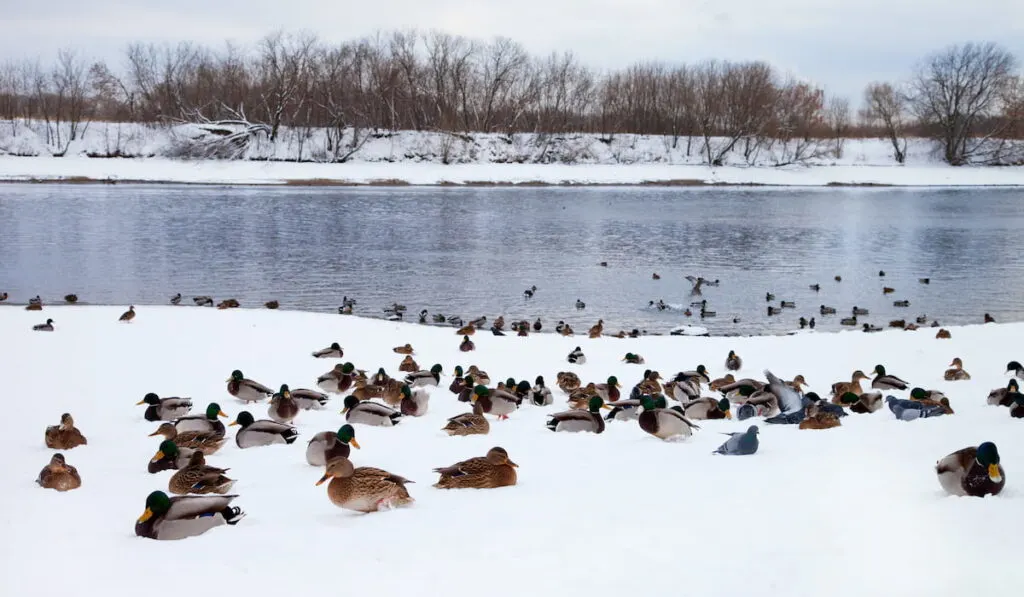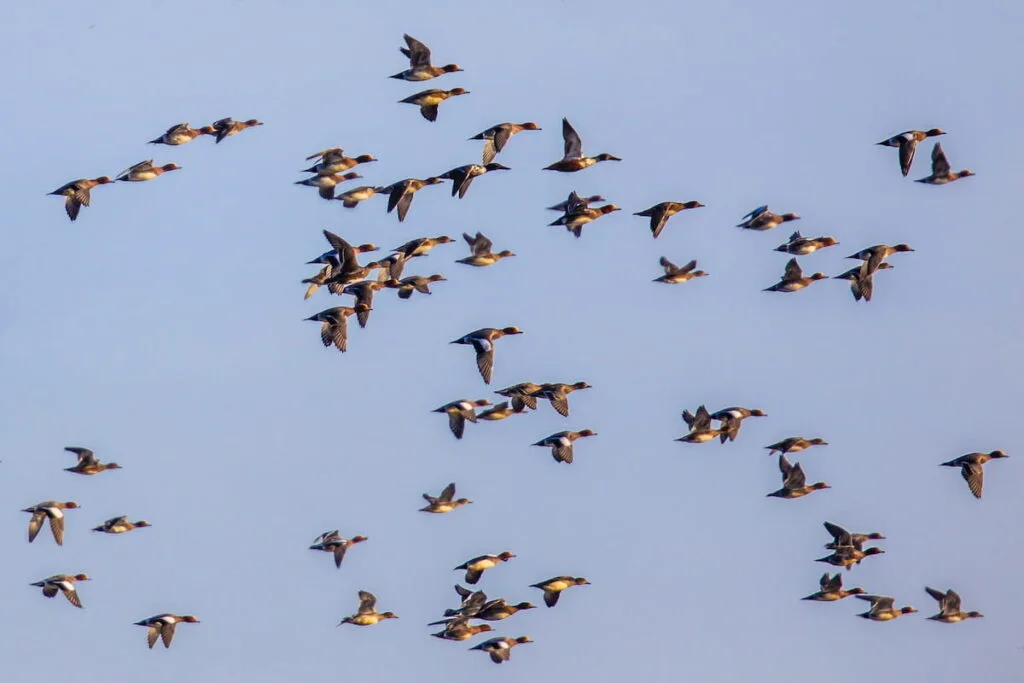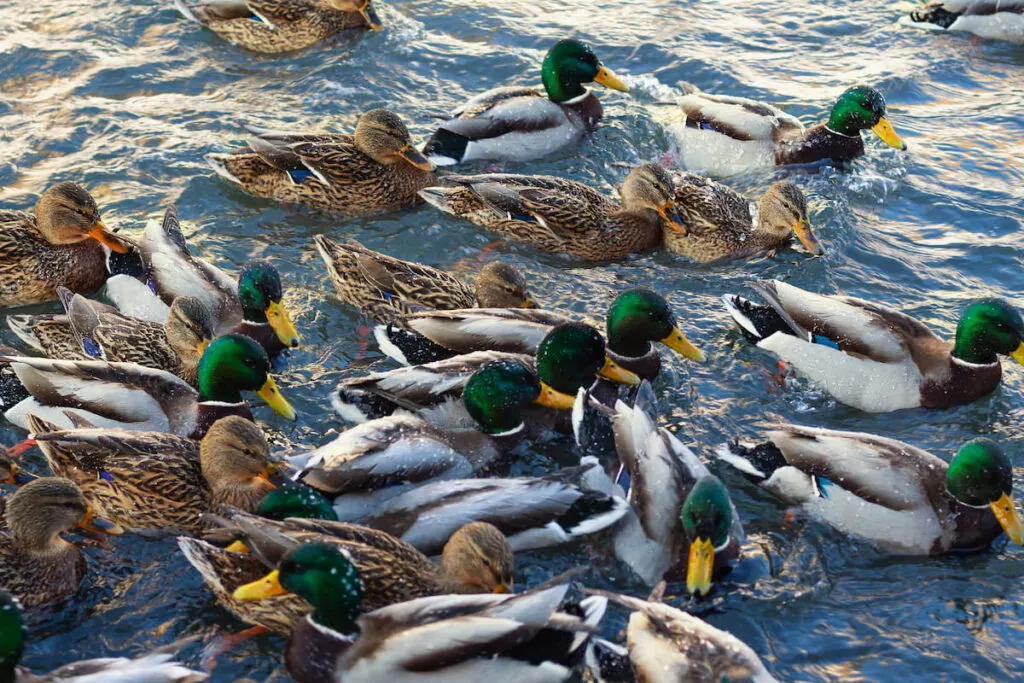During winter, temperatures sometimes get too low, leading to freeze-up in northern states. When this happens, the waterfowl season comes to an end.
But what happens to ducks after that, and where do they go? Luckily, this article is here to answer all your questions.
Table of Contents
What do ducks do in the winter?
In winter, ducks search for foods that help them accumulate fat which in turn would help to keep them warm. They also bond with their breeding mates in preparation for early spring nesting.

And they take a lot of rest to preserve energy for burning fats to keep warm when it’s frigid.
Please keep reading to learn what wild ducks do in the winter, where they go, and how they survive. We will also examine whether ducks can hibernate, swim in cold water, and more. Let’s dive in!
What Do Wild Ducks Do in Winter?
Wild ducks use wintertime to rest and look for food. During this time, they accumulate and preserve fats and energy for use when it’s freezing, and food is scarce.
The winter is also bonding time for breeding mates to prepare for early spring nesting. Some migrate to warmer areas to find food and look for nesting sites.

Where Do They Go?
Some wild animals relocate to warmer areas while others hibernate as winter sets in. But not all birds leave their habitat. So, what of wild ducks?
Where do they go when it is winter?
Wild ducks are cold-hardy and can withstand low temperatures. However, this does not mean they enjoy staying in freezing weather.
Most wild ducks in the north move to the southern states in the winter rather than deal with the snow and ice.
As temperatures begin to drop, you may spot them forming bigger groups. Sometimes, you may see them fly in ‘V’ formations. Some common migratory spots include Georgia and Florida.
Like tourists, many wild ducks fly to Florida during winter and return to their nesting habitat and ‘summer’ home later on. Ducks can fly almost 800 miles in search of a warm home. Those that remain in their habitats look for shelter as they search for ponds and lakes that are not frozen.
However, not all winters are the same. For instance, those ducks whose habitats are in Georgia and Florida do not need to migrate.

Do Ducks Hibernate?
Ducks do not hibernate during winter. They stay active, searching for the right food that would enable them to gain enough fat so as to be able to stay warm all through winter.
Moreover, winter is a difficult season for these birds.
They face danger from starving predators and severe weather conditions. Therefore, they must be actively creative to survive.
They rest to avoid wasting energy unnecessarily and only use it on:
- Looking for food
- Courtship
- Looking after their ducklings
How Do They Survive?
The ducks’ most challenging difficulties in extreme winter weather include:
- Limited feeding opportunities due to snow and ice covering their foraging grounds.
- High energy requirements for maintaining their body temperatures.
If you keep domestic ducks, it is necessary to ensure these semi-aquatic birds do not freeze to death when it gets too cold in winter.
Wild ducks, on the other hand, are exceptionally adapted to survive the freezing weather of winter.
Such adaptations include:
Wild Ducks Have a Countercurrent Heat Exchange Mechanism
The veins and arteries in the duck’s feet are closely aligned. The proximity allows heat transfer between warm blood flowing from the bird’s body and cold blood from the feet. The heat exchange helps ensure that cold blood does not flow into the bird’s body.
This helps maintain the core temperature and keeps the bird’s body warm. At the same time, some heat reaches the feet, preventing them from freezing.
Ducks Can Accumulate and Preserve Fat
Like bears, ducks can accumulate and store fat. It is this stored-up fat that the ducks use when it’s too cold and risky to search for food.
The Ducks’ Feet Contain Less Nerve Tissue and Muscles
There are fewer nerve tissues and muscles in the feet of ducks when compared to humans. Thus, they are less susceptible to frostbite and can endure low temperatures.
Ducks Have Specialized Scales
The legs and feet of ducks have special protective scales that help reduce heat loss.
Ducks Tuck Their Bills and Feet
Have you ever seen a duck standing on one foot and wondered why? They do this to help them keep warm.
They sometimes sit down, tucking both feet in the feathers. They also tuck their bills in the feathers to keep them warm and breathe warmer air.
Wild Ducks Hunker Down to Avoid Exposure to Brutal Weather
Sometimes, when the weather is unbearably harsh, wild ducks will often lay low so as to avoid exposure to such brutal weather as it can prove to be fatal. During such time, therefore, these birds will burn the fat they had previously stored.
Wild Ducks Have Special Feathers
Another amazing thing about wild ducks is that they also have special feathers which they use for trapping air that helps regulate their body temperature.
Wild Ducks Are Migratory Birds
Wild ducks generally move to warmer areas where they can find food. Thus, they can avoid freezing and starving to death.
Wild Ducks Form Bonds With Their Breeding Mates
Before the harsh frigid conditions of winter sets in, wild ducks would have formed a strong bond with breeding mates. This bond helps transfer heat between the birds and keeps their bodies warm as they live and move together.
Wild Ducks Switch to Meat-Based Foods and Insects
In normal weather conditions such as summer, wild ducks would often feed on things like vegetation and fish. But during winter, these sources of food are inaccessible as the vegetation is covered in snow while the water is already frozen.
Hence, wild ducks make ends meet by switching to eating insects and meat-based foods.

Can Ducks Swim in Cold Water?
We all know swimming in a freezing pool isn’t the best idea. As humans, hypothermia will set in within seconds if we attempt to swim in freezing waters. Therefore, for humans, contact with frozen water is a matter of life and death.
However, while it is a colossal misery for us, the chilly water isn’t a big deal for the ducks to swim in. Have you ever wondered why ducks hang out in ice-cold water without their thin bare feet sustaining irreparable damage?
Ducks can swim in cold water without suffering hypothermia or frostbite.
They are able to comfortably swim in freezing water due to the countercurrent heat exchange mechanism discussed above. Moreover, their feathers have waterproofing oil that helps insulate the body.
Final Thoughts
Wild ducks spend most of the winter resting, looking for food, and bonding with their breeding mates. While they are cold-hardy, wild ducks are also migratory birds. Therefore, some fly to find warmer homes when temperatures drop to a freeze-up.
So, the next time you visit Florida in the winter, you may spot these unique “tourists!”
Resources
- https://www.currentresults.com/Weather/US/average-state-temperatures-in-winter.php
- https://www.allaboutbirds.org/news/what-to-watch-for-duck-courtship-video/
- https://www.rspb.org.uk/birds-and-wildlife/wildlife-guides/bird-a-z/mallard/breeding/
- https://www.fws.gov/story/how-do-birds-keep-warm-winter
- https://www.allaboutbirds.org/news/how-do-gulls-deal-with-cold-feet/
- https://eccentricscientist.wordpress.com/2007/01/13/why-dont-ducks-get-frostbite/
- https://www.ducks.org/conservation/waterfowl-habitat/winter-homes-for-waterfowl
- https://www.ducks.org/conservation/waterfowl-research-science/amazing-waterfowl-facts
